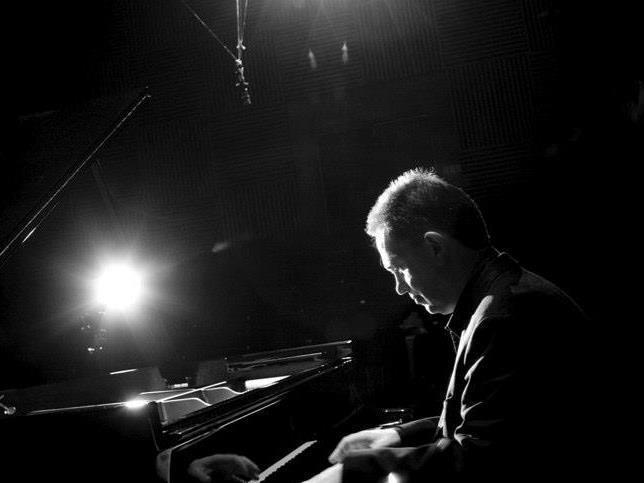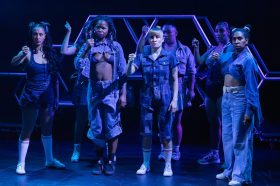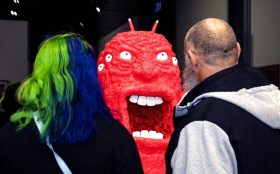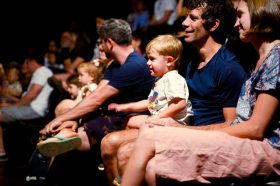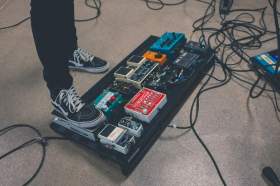David Wickham, piano. Photograph by Matt Galligan.
SwanSongs is the brainchild of Perth-based entrepreneur and accompanist extraordinaire, David Wickham. This year’s featured artists are Ileana Rinaldi, Sam Roberts-Smith, Sara Macliver and Emma Matthews in three discrete performances over a period of eight weeks. The first, aptly named Cameos, featured Rinaldi (mezzo-soprano) and Roberts-Smith (baritone) alongside Wickham. Roberts-Smith was an Opera Australia Young Artist for three years, and has subsequently toured with The Ten Tenors and appeared on operatic stages on four continents. Rinaldi was one of the finest discoveries of the Australian Opera Studio and has performed several principal roles for WA Opera. Both underwent training at WAAPA, both are multiple award-winners, and both have extensive overseas experience. Last year, they were ‘Mentored Artists’ at the WA Opera.
There is a lot of training and experience to develop not just the voice, but also the confident performance style that marks the mature artist. Both singers clearly demonstrated their ability to drop into a given character at the start of every song. The choice of material was varied, interesting, challenging and innovative. Seven composers were represented, all with little-known works, although in some cases the songs were adapted by the composers to or from better-known operatic arias.

Sam Roberts-Smith, baritone. photograph via davidwickham.me.
Roberts-Smith set the ball rolling with a Donizetti bracket. The opening piece, Canzone Napoletana, immediately demonstrated his feeling for style and rhythm. He also showed a confident but not ebullient stage presence, together with excellent technique and breath control. The other two songs in the bracket were Lamento per la Morte di Bellini (Bellini was a close friend of Donizetti) and Amiamao. This piece (sung in Italian) appeared to end with the phrase ‘Yum-yum’ which raised a laugh!
Rinaldi’s first bracket comprised three Verdi songs: Non t’accostare all’urna, La Zingana and Il poveretto. These were excellent choices, demonstrating Rinaldi’s ability to change mood and character. She has a powerful mezzo voice with a big vocal range and a nice timbre. A mature woman, she is also has an assured, confident stage manner.
Rinaldi’s second bracket drew on the works of Richard Strauss. This composer’s work often hovers between aria and art song, and the complicated accompaniments added depth to the presentation.
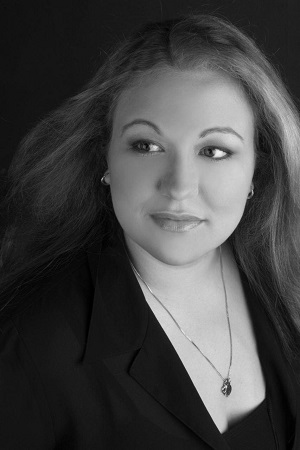
Ileana Rinaldi, mezzo-soprano. Photograph via davidwickham.me.
Roberts-Smith returned to give us a taste of Bizet, without any reference to the ubiquitous Carmen. Here again, the accompaniments were complex, ranging from the bagpipe-like rhythm for the left hand in Ouvre ton coeur to the lyrical sadness of Absence.
A pleasant interval with refreshments followed, and thus fortified, we returned for the second half. Rinaldi came back to give us three songs by Wagner. Self-assured and professional, she used sheet music in a completely unobtrusive fashion. The last of the Wagner works, Schmerzen, included some incredibly difficult intervals, but Rinaldi handled them with ease.
Roberts-Smith returned with a bracket of highly contrasting offerings by Saint-Saëns. One of them L’enlèvement proved to be a jolly romp in 12/8 time. (I was tempted to jump up and skip at the back of the room, but thought better of it.) The last one in this bracket Hymne à Eros, was based on a chorus from Sophocles’s Antigone. It was, apparently, an attempt to recreate ancient Greek music. Beautifully rendered by Roberts-Smith and Wickham, it sported a piano part that JS Bach would have loved.
Rinaldi’s final offering was a selection from Nine Shakespeare Songs by Erich Wolfgang Korngold. Five of the nine songs were included in this bracket. They included plenty of contrast, with varied accompaniments that ranged from folk-song to art song in style. In fact, this concert overall gave us a good deal of variety, providing an outing for some rarely-heard compositions. All three artists are highly gifted and expressive. Several times, there was that reception that performers love: a sigh’s length of silence before tumultuous applause. When that happens, the performer knows s/he did OK!
David Wickham, by the way, should be congratulated on his extensive printed program, which contained not just the program itself, but details of the artists, the composers, the featured works, and even the songs’ lyrics, both in their original languages and in English translations!
My only gripe – and it’s a very small one – was that there was no encore. I hoped – maybe even expected! – that the singers would sing together for a finale, and when I mentioned this to a friend, he said he’d thought exactly the same thing! A humorous duet would have rounded the concert off beautifully.
All in all, an excellent start to the 2016 SwanSongs season. The next episode, Solace, on September 4, will feature much-loved soprano Sara MacLiver.
Rating: 5 stars out of 5
SwanSongs 2016: Cameos
David Wickham, pianist
Sam Roberts-Smith, baritone
Ileana Rinaldi, mezzo-soprano
Perth Town Hall
31 July 2016
